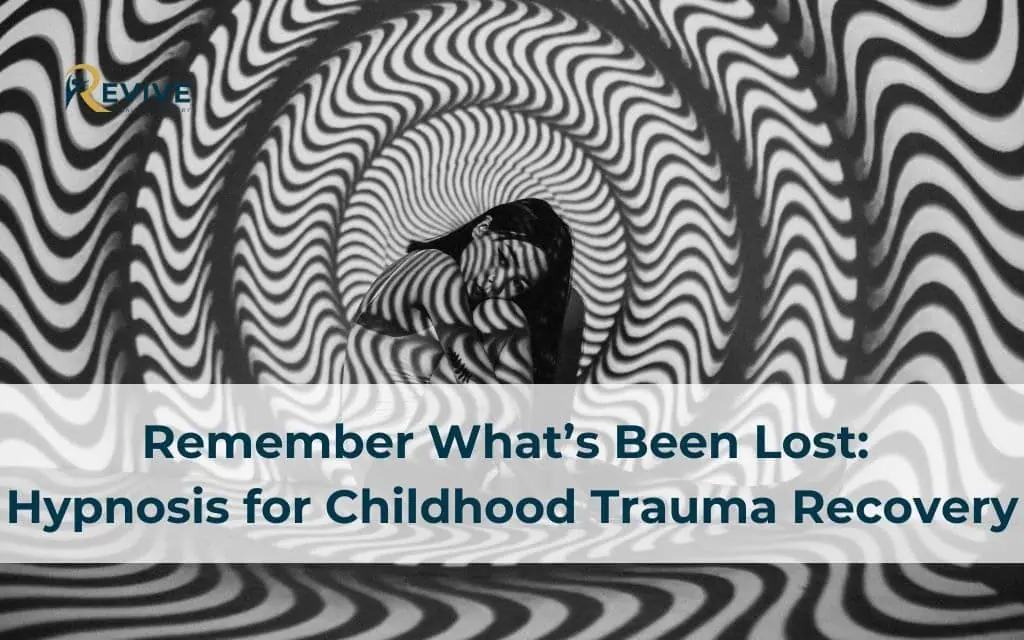Childhood trauma leaves deep imprints that often remain hidden beneath the surface of our conscious minds. For many, these buried memories create ongoing challenges in daily life without a clear understanding of their source. Hypnosis for remembering childhood trauma offers a potential pathway to access these memories in a therapeutic setting, providing opportunities for processing and healing long-held wounds.
Denver has emerged as a center for innovative mental health approaches, including specialized trauma treatment options. At Revive Health Recovery, we understand the complexity of childhood trauma and the delicate nature of memory recovery work. This article explores how hypnosis for remembering childhood trauma can serve as a therapeutic tool, the benefits and risks involved, and resources available to Denver residents seeking this specialized form of therapy.
The State of Mental Health and Trauma in Denver, Colorado
Denver’s Mental Health Statistics
Colorado ranks 45th out of 51 states for adult mental health care, indicating significant challenges in addressing mental health needs across the state. Denver specifically has seen rising rates of trauma-related conditions, with an estimated 15% of residents reporting symptoms consistent with post-traumatic stress disorder (PTSD). The National Center for PTSD has identified urban areas like Denver as having unique trauma profiles, with challenges ranging from community violence to displacement trauma.
In response to these challenges, Denver has expanded its mental health services, with specialized trauma care becoming increasingly accessible. Organizations like the Colorado Association of Psychotherapists have reported a 27% increase in trauma-specific treatment requests since 2023.

Why Denver Residents Seek Trauma Therapy
Denver’s rapid growth has created unique stressors that can trigger or exacerbate trauma responses. Housing instability, changing neighborhood dynamics, and the pressures of urban living contribute to mental health challenges across the city. Additionally, Denver’s diverse communities face varied trauma experiences, from immigration-related trauma to generational trauma within historically marginalized groups.
Local initiatives like Denver’s Trauma-Informed Care Collaborative have begun addressing these needs through community-based programs, complemented by mental health resources in Colorado. These efforts reflect growing recognition that trauma treatment must be accessible, culturally responsive, and diverse in its approaches – including alternative trauma therapy options like hypnosis for remembering childhood trauma.
Understanding Childhood Trauma and Its Impact on Memory
What is Childhood Trauma?
Childhood trauma encompasses experiences that overwhelm a child’s ability to cope and process. These may include physical or sexual abuse, emotional neglect, witnessing violence, experiencing a natural disaster, or enduring chronic stress in an unsafe environment. These experiences can fundamentally alter trauma’s impact on brain development, particularly in regions responsible for memory, emotional regulation, and stress response.
The brain’s protective mechanisms sometimes store traumatic memories differently than ordinary ones. This special encoding can make these memories difficult to access through conscious recall, yet they continue to influence emotions, behaviors, and responses to triggers.
How Trauma Affects Memory
Trauma can fragment memories, storing emotional and sensory components separately from narrative details. This fragmentation explains why trauma survivors might experience intense emotional reactions without understanding why, or have physical sensations triggered without connecting them to past events. Some memories may be partially or completely inaccessible to conscious recall—a phenomenon sometimes referred to as repression or dissociative amnesia.
The concept of repressed memories remains controversial within psychological communities. However, there’s growing consensus that trauma can disrupt normal memory processing, creating gaps or distortions in how experiences are stored and recalled. For some, these memories may resurface unexpectedly. This understanding has opened doors to therapeutic approaches that work with memory in different ways, including hypnosis for remembering childhood trauma.
What is Hypnosis and How Can It Help?
The Basics of Hypnosis
Hypnosis creates a state of focused attention and heightened suggestibility where the conscious mind becomes less dominant and the subconscious more accessible. During this state, brainwave activity shifts to patterns associated with deep relaxation and increased internal awareness. This relaxed but focused state allows for exploration of memories, emotions, and patterns that might otherwise remain inaccessible.
Contrary to popular misconceptions, hypnosis doesn’t involve mind control or unconsciousness. Instead, it creates a collaborative therapeutic space where clients remain aware and in control while accessing deeper levels of their own experience. This makes it potentially valuable for subconscious healing work, including trauma resolution.
Is Hypnotherapy Safe for Trauma Recovery?
When conducted by qualified professionals trained in trauma-informed care, hypnotherapy can be a safe approach to trauma recovery, guided by clinical hypnosis standards that prioritize client safety. The Denver Hypnotherapy Center emphasizes that proper training and specialization in trauma work are essential for practitioners offering hypnosis for remembering childhood trauma. Ethical hypnotherapists understand the potential risks and take precautions to minimize them.
The American Society of Clinical Hypnosis provides certification and ethical guidelines for hypnotherapy practitioners, ensuring standards of practice that prioritize client safety. Many qualified Denver hypnotherapists maintain this certification, along with specific training in trauma recovery.
Like any therapeutic approach, hypnosis may not be suitable for everyone. Individuals with certain psychiatric conditions or those who are highly suggestible may need different treatment approaches. A thorough assessment by a qualified mental health professional can determine whether hypnosis for remembering childhood trauma is appropriate for your specific situation.
Hypnosis Techniques for Trauma Recovery
Trauma-Focused Hypnotherapy Methods
Several hypnotherapy techniques show promise for trauma recovery:
Age Regression guides clients to revisit past experiences while maintaining adult awareness and resources, allowing for new perspectives on childhood events.
Memory Retrieval techniques help access fragmentary or partially remembered experiences, potentially filling gaps in understanding personal history.
Inner Child Work establishes communication between adult and child aspects of self, facilitating emotional release and nurturing of wounded parts.
Memory Reconsolidation utilizes the brain’s ability to update emotional responses to memories, potentially reducing their triggering power.
These techniques aim not only to recover memories but to process them in ways that promote integration and healing, supported by scientific evidence on hypnosis for trauma. The goal extends beyond remembering to transforming the emotional impact of traumatic experiences.
Hypnosis vs. Traditional Talk Therapy
While traditional talk therapy operates primarily at the conscious level, hypnosis for remembering childhood trauma accesses subconscious material directly. This can be particularly valuable when trauma memories are not readily available to conscious recall or when logical understanding hasn’t resolved emotional reactions.
Talk therapy excels at developing insights, skills, and cognitive understanding, while hypnosis may more directly address emotional and physiological aspects of trauma. Many practitioners in Denver use integrative therapy approaches that combine these modalities, tailoring treatment to individual needs and responses.
Research suggests that combining hypnosis with cognitive-behavioral therapy can enhance outcomes for certain trauma symptoms. This integrated approach acknowledges that trauma affects multiple levels of functioning and may benefit from diverse therapeutic strategies.

Comparing Trauma Recovery Approaches in Denver
Hypnosis vs. EMDR Therapy
Eye Movement Desensitization and Reprocessing (EMDR) has gained popularity in Denver’s mental health community as a trauma treatment. Both EMDR and hypnosis for remembering childhood trauma aim to access and reprocess traumatic memories, but they use different mechanisms:
- EMDR utilizes bilateral stimulation (typically eye movements) while focusing on traumatic memories
- Hypnosis employs relaxation and focused attention to access subconscious material
Research comparing these approaches suggests they may work through somewhat different neurological pathways. EMDR has more extensive research validation specifically for PTSD, while hypnosis has broader applications across various trauma symptoms.
Denver practitioners often specialize in both approaches, with some reporting that certain clients respond better to one method than the other. The choice between them may depend on individual factors including personal comfort, specific symptoms, and treatment goals.
Integrated Approaches: When to Combine Methods
Many of Denver’s leading trauma specialists use complementary therapies for PTSD and other trauma conditions. An integrated approach might include:
- Hypnosis for remembering childhood trauma to access and process difficult memories
- Mindfulness and hypnosis practices for managing triggers
- Cognitive-behavioral techniques for restructuring trauma-related beliefs
- Body-based interventions for addressing physical aspects of trauma
Dr. Sarah Johnson, a Denver trauma specialist, notes: “We often see the best results when treatment addresses all levels—cognitive, emotional, physical, and spiritual. For some clients, hypnosis for remembering childhood trauma provides a doorway to aspects of their experience that other methods haven’t reached.”
Case examples from Denver clinics suggest that tailored combinations of therapies often yield better outcomes than rigid adherence to a single approach. This holistic mental health perspective has become increasingly common in Colorado’s trauma treatment landscape.
The Risks and Controversies of Using Hypnosis for Trauma
The False Memory Debate
One significant concern with hypnosis for remembering childhood trauma involves the potential creation of false memories. Hypnosis increases suggestibility, which could theoretically lead to the development of memories that didn’t actually occur, especially with leading questions or suggestions from a therapist. This risk underscores the importance of working with practitioners who understand these dynamics and use protocols designed to minimize suggestion.
Ethical hypnotherapists prioritize non-leading approaches and maintain awareness of memory’s malleable nature. They typically avoid making assumptions about what may have happened and instead create space for the client’s own experience to emerge. Informed consent includes discussing these risks before beginning memory-focused work.
Scientific Research on False Memories and Hypnosis
Research on memory retrieval through hypnosis presents a complex picture. Studies show that hypnosis can enhance recall of certain types of information but may also increase confidence in both accurate and inaccurate memories. The heightened confidence without increased accuracy represents a particular concern for trauma recovery work.
Current research indicates that memories recovered during hypnosis for remembering childhood trauma should be approached as potentially meaningful psychological material rather than necessarily accurate historical records. This perspective allows therapeutic work to proceed with both respect for the client’s experience and appropriate caution about memory’s reconstructive nature.
Scientific understanding continues to evolve, with newer studies focusing on identifying factors that influence memory reliability during hypnosis. This ongoing research informs best practices in the field.
Legal and Ethical Considerations in Colorado
Colorado does not currently regulate hypnotherapy as a distinct profession, making it essential for consumers to verify practitioners’ credentials. However, licensed mental health professionals who use hypnosis (psychologists, clinical social workers, professional counselors) must adhere to their profession’s ethical standards and scope of practice requirements.
The Colorado Department of Regulatory Agencies provides resources for verifying licenses and filing complaints if concerns arise. Ethical practitioners will clearly communicate their qualifications, approach, and the limitations of hypnotherapy for trauma recovery.
Consumers should expect:
- Clear information about training and credentials
- Thorough informed consent processes
- Respect for client autonomy and boundaries
- Appropriate referrals when needed
- Documentation of treatment
When Hypnosis Might Not Be Recommended
Hypnosis for remembering childhood trauma requires careful consideration for individuals with certain conditions or vulnerabilities. It may not be recommended as a primary approach for people with:
- Severe dissociative disorders
- Active psychosis or certain personality disorders
- Highly suggestible personalities combined with vulnerability to influence
- Individuals seeking memory recovery primarily for legal proceedings
Additionally, some trauma presentations may respond better to other evidence-based approaches initially. A comprehensive assessment by a trauma-informed mental health professional can determine whether hypnosis is appropriate and what precautions might be needed.
Finding Qualified Hypnotherapists in Denver
How to Choose the Right Therapist
When seeking a hypnotherapist for childhood trauma work in Denver, consider these factors:
Verify credentials: Look for licensed mental health professionals (psychologists, clinical social workers, professional counselors) who have additional training in hypnotherapy. Check certification with organizations like the American Society of Clinical Hypnosis.
Assess trauma expertise: Ask about specific training and experience in trauma treatment. Trauma-informed care requires specialized knowledge beyond basic hypnosis training.
Interview potential therapists: Important questions include:
- “What is your approach to memory recovery work?”
- “How do you address the possibility of false memories?”
- “What safeguards do you use in trauma-focused hypnosis?”
- “How do you determine if hypnosis for remembering childhood trauma is appropriate for a particular client?”
Trust your instincts: The therapeutic relationship significantly impacts treatment effectiveness. Choose someone with whom you feel safe and understood.
Denver’s Specialized Trauma Centers
Denver offers several specialized centers for trauma treatment:
The Center for Trauma & Resilience provides comprehensive trauma services, including some complementary approaches, with sliding scale options for affordability.
Trauma & Disaster Recovery Clinic at the University of Denver offers evidence-based trauma treatments and participates in cutting-edge research on trauma recovery.
Revive Health Recovery specializes in trauma-informed care with integrated approaches that may include hypnotherapy when appropriate. Our team includes specialists trained in both traditional and complementary modalities for trauma resolution.
Many Denver clinics now incorporate holistic mental health perspectives that acknowledge the interconnection between mind, body, and spirit in trauma recovery. These centers typically offer assessment services that can help determine the most appropriate treatment approach for your specific needs.
Insurance Coverage for Hypnotherapy in Colorado
Insurance coverage for hypnosis for remembering childhood trauma in Colorado varies significantly by provider and plan. Generally:
- Hypnosis performed by licensed mental health professionals may be covered when billed as part of psychotherapy
- Stand-alone hypnotherapy by non-licensed practitioners is typically not covered
- Some plans may cover hypnosis with a physician referral for specific conditions
If insurance coverage is important, verify benefits before beginning treatment and ask potential providers about their experience with insurance reimbursement. Some therapists offer sliding scale fees or payment plans to make treatment more accessible.
For specific questions about coverage and costs related to trauma treatment, contact us at Revive Health Recovery at (303) 268-4655. Our team can help navigate insurance questions and identify affordable options for quality trauma care.
Denver Success Stories: Healing Childhood Trauma Through Hypnosis
While maintaining strict confidentiality, Denver therapists report numerous success stories of trauma recovery through hypnotherapy. These cases typically show gradual progress rather than dramatic breakthroughs.
One Denver woman in her 40s sought help for unexplained anxiety and relationship difficulties. Through hypnosis for remembering childhood trauma, she accessed early childhood memories of emotional neglect that had been minimized by her family. Processing these experiences allowed her to recognize patterns, develop self-compassion, and establish healthier boundaries. Over six months of treatment, her anxiety symptoms decreased by approximately 60%.

Another case involved a man with trauma-related insomnia and nightmares. Traditional approaches had provided limited relief, but hypnosis helped him access and reprocess traumatic memories. His sleep quality improved significantly within three months, and the frequency of nightmares decreased from several times weekly to once or twice monthly.
Statistics from Denver practitioners suggest that approximately 70% of clients experiencing trauma symptoms show meaningful improvement with integrated approaches that include hypnosis. However, results vary considerably based on individual factors, trauma complexity, and treatment approach.
FAQs About Hypnosis for Remembering Childhood Trauma
Is hypnotherapy safe for trauma recovery?
When conducted by qualified professionals trained in trauma-informed practices, hypnosis can be safe and effective. Revive Health Recovery employs only licensed clinicians with specialized training in trauma treatment.
What are the risks associated with hypnosis for trauma?
Risks include potential for false memories, temporary emotional distress, and the possibility of uncovering traumatic material without adequate processing time. Working with our experienced team minimizes these risks through careful pacing and support.
How to choose a hypnotherapist for childhood trauma?
Look for licensed mental health professionals with specialized training in both hypnosis and trauma treatment. Revive Health Recovery offers trauma-informed care that may include hypnotherapy when appropriate. Contact us at (303) 268-4655 to learn about our specialized trauma services.
How many sessions might I need for trauma processing?
Treatment length varies widely depending on trauma complexity, support systems, and individual factors. Many clients see meaningful improvement within 8-12 sessions, though complex trauma may require longer treatment. Our team provides personalized treatment plans based on your specific needs.
What is the average cost of hypnotherapy for trauma in Denver?
Costs vary based on provider credentials, session length, and treatment setting. For information about our current rates and insurance options, please contact Revive Health Recovery directly.
Conclusion: Taking the Next Step Towards Healing
Hypnosis for remembering childhood trauma offers a potential pathway to accessing and processing difficult memories, though it requires careful consideration and professional guidance. Denver residents have access to qualified practitioners and specialized centers that understand the complexities of trauma recovery.
The journey of healing from childhood trauma rarely follows a straight line. It requires courage, support, and typically benefits from integrated approaches that address the full person. While hypnosis for remembering childhood trauma may play a valuable role in this process, it works best as part of a comprehensive treatment plan tailored to individual needs.
If you’re considering hypnosis for remembering childhood trauma, begin with a thorough assessment by a qualified mental health professional. This will help determine whether hypnosis is appropriate for your situation and what other approaches might be beneficial.
Revive Health Recovery offers trauma-informed care with a holistic perspective and gentle recovery approach that honors each person’s unique healing journey. To explore how we might support your path toward healing, contact us at (303) 268-4655.
Remember that regardless of how much time has passed, healing from childhood trauma is possible. With appropriate support and effective therapeutic approaches, many people find not just relief from symptoms but new possibilities for connection, joy, and authentic living.



